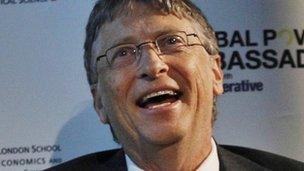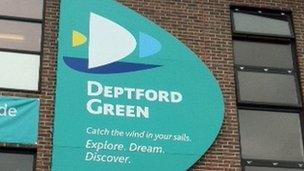Bill Gates tells school pupils about giving it all away
- Published

Bill Gates told pupils he began his computing career by producing a school timetable
When a south London secondary school asked for an inspiring guest speaker to talk to their pupils, they didn't expect Bill Gates to turn up.
But youngsters at Deptford Green School, gathered in their school hall on Wednesday morning, found themselves being addressed by one of the great philanthropists of the modern age.
Mr Gates, on the classic Seattle-Deptford-Davos route, received a rapturous welcome from a packed hall full of south London teenagers.
Before he arrived, the pupils had been told by teachers to "face the front and look interested", but there was no need for any choreographed enthusiasm, because these youngsters seemed to be really engaged by his story.
His first big break in computing, he told the pupils, was when he was asked to fix the school timetable system which had baffled the teachers. It got him two things, he said, control over the schedule and money.
"I was known as a computer nut. I'd stay on it night and day," he said.
He told pupils how he'd dropped out of Harvard - "still dreaming of a personal computer" - and had begun on the road to become the Microsoft mogul that made him so famously wealthy.
"If I hadn't given my money away, I would now have more money than anyone else on the planet," he said casually.
And it's the giving away that makes him so interesting.
Eradicating polio
His philanthropy is on an epic scale. He is seriously planning to eradicate diseases in his lifetime that have plagued humanity for thousands of years.

Bill Gates visited Deptford Green as part of the Speakers for Schools project
The Bill and Melinda Gates Foundation has already given $26bn (£17bn) to fund health, development and education projects.
Even the biggest cynic would have to be impressed by this massive engine of generosity, with Bill Gates working full time on donating the income from an endowment worth $33.5bn (£21.5bn).
And he told the Deptford schoolchildren how his foundation was methodically working to get rid of every last case of polio, a scourge which had paralysed hundreds and thousands of people each year.
There's a hit list of 12 diseases which he wants to target - and he told the Deptford pupils that what had really surprised him was that these preventable illnesses had not been stopped before and that there had not been more innovation in vaccines.
"I was stunned how little resources had gone into this," he said.
His foundation's work is carried out with a "hard-nosed mathematical" approach, he says, calculating the impact in terms of "dollars per year of life saved".
He is applying the same attention to detail that made him such a business success into the business of saving lives.
'Cool stuff'
Bill Gates took questions from the children in Deptford, as well as young students who joined via video-link from Libya, Russia, Uganda and Kenya as part of the BBC World Service programme, World Have Your Say.
They asked about discrimination against homosexuals, disability, and - in the case of Uganda - the difficulty of living in a community with HIV/Aids.
He answered questions with a relaxed, self-deprecating style that went down well with his young audience. He has his own geek-chic, with his Windows haircut, peppering his answers with phrases like "cool stuff".
"When I was your age, I didn't know much about poverty," he told them, describing his school as "super nice" and a place where he was the kid who was good at maths.
Now he was immersed in tackling the worst diseases in the poorest communities in the world.
"The goal is equality. If we don't have these diseases, why should people in Africa or Asia?"
One of the girls in the audience, speaking afterwards, was particularly impressed that he had worked hard to earn the money that he had now decided to donate.
Unprompted, another pupil described his decision to give his fortune away as "really inspiring".
Getting Mr Gates to a community school in south London was also an impressive feather in the cap for the Speakers for Schools project, set up by the BBC's Robert Peston - which seeks to get high-profile figures to talk to pupils in state schools.
Nick Chambers, director of the Education and Employers Taskforce which administers the scheme, told the school assembly that this unexpected visit from Bill Gates all came from a Friday night in November when English teacher Keely Wilson decided to apply for someone interesting to visit.
She wasn't disappointed.
- Published25 January 2012
- Published12 June 2011